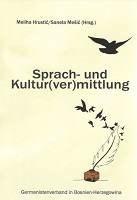Verwendung von lexikalisierten Diminutiven bei Körperteilbezeichnungen im Deutschen und im Bosnischen
Use of lexicalized diminutives in body part designations in German and Bosnian
Author(s): Meliha Hrustić
Subject(s): Theoretical Linguistics, Lexis, Comparative Linguistics, Health and medicine and law
Published by: Društvo germanista u Bosni i Hercegovini (DGuBiH) / Germanistenverband in Bosnien-Herzegowina (GViBH)
Keywords: German; Bosnian; body part designations; lexicalized diminutives;
Summary/Abstract: Diminutives are grammatical diminutive forms of nouns (Latin deminuere – reduce, lessen). In both languages there are diminutive suffixes used for diminutive forms: in German -chen and -lein, in Bosnian: -(a)k, -ance, -ašce, -ca, -ce, -čić, -čica, -ica and some other suffixes. Moreover, diminutives are often used to denote that something is cute: Hund – Hündchen, pas – psić, etc. However, in this article attention is paid to fixed diminutive forms, i.e. word forms that are lexicalized as such. These are expressions such as Kaninchen, Maskottchen, Schnäppchen, Mädchen, Veilchen, etc. It is often mentioned in the literature that diminutive formations are much more widespread in Slavic languages than in Germanic languages. This fact is examined here using the example of body part terms in both languages. It is assumed that in Bosnian, etymologically, there are many diminutives (potkoljenica, jagodica, materica, etc.), while in German the diminutives are much less common in the corpus (Zäpfchen).
Book: Sprach- und Kultur(ver)mittlung
- Page Range: 83-97
- Page Count: 15
- Publication Year: 2022
- Language: German
- Content File-PDF

